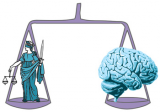
The bioethics law by Article 45 recognizes the use of brain imaging in the context of judicial expertise. In this context, the Strategic Analysis Centre published a paper on the challenges of "neurodroit" neologism which refers to the field of research concerned with legal applications of neuroscience. Two main areas of interest are identified: first use of brain imaging as evidence in a trial, on the other hand understanding of the mechanisms through deliberative behavioral sciences.
The brain and the law and practice ethical neurodroit
According to some, the judiciary could use functional brain imaging for law enforcement purposes (confuse a criminal), preventive (determining the dangerousness of an individual), and therapeutic (developing methods of remediation). If the operation of neuroimaging in the courts is far from being a reality in France, but it grows in other countries, like the United States, prompting divergent opinions. For some, it could be the "new DNA". For others, it would be an illusion, a factor threatening certain fundamental principles of judicial procedure. The long term possibility of a better administration of justice - by an increased understanding of criminal behavior - should not obscure the more important technical limitations. Indeed, while the use of anatomical brain imaging has already proved useful, for example to establish the existence of a head injury, the functional imaging, for example, detect lies or approve the responsibility of an accused would be very premature. Beyond considerations of reliability, generalization of neuroimaging may cause increased personalization of justice, with the risk that invite caution.
In addition, the defendants are not the only subjects of study neurodroit. A substantial literature in behavioral science focuses on others trial (judges, lawyers, jurors) and shows including through psychological and contextual intelligence or fatigue, they are sometimes victims. Develop and disseminate this research could eventually lead to help them protect themselves.
Summary
- Neuroimaging as evidence
- Towards a better understanding of deliberative processes through behavioral sciences?
- Authors: Olivier Oullier and Sarah Sauneron, Social Issues Department .
Keywords: justice, decision neuroscience, through psychological truth.

